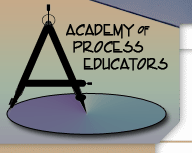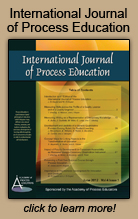|
Revised January, 2012
To See the Original 2007 Plan With 2010 Assessment Click
Here
To See the Revised 2010 Plan Click
Here

CORE VALUES
Growth
We value
transformational learning that positively impacts individuals
and organizations and is sustained by ongoing reflection
and assessment activities designed to produce measurable
improvement.
Community
We value
the synergy and strength generated via collaboration and
communication with colleagues from a diverse array of disciplines,
backgrounds, cultures, and perspectives working together
to elevate learning across many contexts.
Performance
We value
increasing and consistent production of high quality results
developed through enriched learning environments built upon
the dedication and integrity of the individuals involved
and utilizing research-based practices supported by clear
criteria and measurable outcomes.
VISION
The
Academy of Process Educators is a recognized leader driving
transformational change in academia guided by the principles
of Process Education.
MISSION
The Academy
drives transformational change in education by generating,
disseminating, and archiving research based on Process Education
principles through:
the advancement of scholarship in teaching and learning,
advocacy on key educational issues,
building an Academy research program,
the professional development of educators, and
coaching and mentoring.
The Academy engages,
supports, and collaborates with a community of educators
by:
delivering an annual conference,
producing a selective, peer-reviewed journal,
offering annual professional development event(s) for members (internationally, nationally and locally),
modeling key elements of Process Education, and
facilitating members’ participation in other professional
venues.

STRATEGIC GOALS & OBJECTIVES
Goal 1 – Build an academy research program.
Objectives:
- On an
annual basis, publish the International Journal of Process
Education (IJPE) as a forum for members and external educators
to present new theory and research relevant to process
education.
- Maintain
a Board of Editors who will collaborate to continually
improve the quality of the review process for the journal.
- Continually
improve the IJPE website to assure clarity and effectiveness
of editor instructions and procedures for authors, including
format information, reviewer criteria and standards, and
timelines.
- Collaborate
with submitting authors through mentoring and technical
editing on a timely basis to assure quality of published
articles.
- Disseminate
IJPE issues through the Academy website and make articles
available through scholarly databases.
- Collaborate
annually in identifying new research projects that are significant
for increasing the quality of measures and outcomes relevant
to process educators’ practice, including one project seeking external funding.
Goal 2 – To hold an annual conference that
meets quality standards set by the Academy Board.
Objectives:
- Identify
a location for the annual conference that will support
the program and be logistically attractive for attendees.
- Establish
a timely, substantive theme for each annual conference
that will provide a focus for keynote speakers and presenters.
- Publish
a call-for-papers and recruit appropriate keynote speakers
and presenters to produce a robust and professionally
valuable program.
- Recruit
members to assist with roles and tasks required for planning,
collaborating with local hosts, recruiting participants,
preparing the conference notebook, running the conference,
and preparing the proceedings.
- Recruit,
annually, an increasing number of Academy members and
host institution stakeholders to the conference.
- Annually identify and implement 2 to 4 conference activities that advance the mission of the Academy.
Goal 3 – Provide a professional forum for
communication and collaboration among members.
Objectives:
- Provide
an annual program of Academy activities for faculty development and renewal
that is approved by the Board at the mid-year meeting and disseminated via newsletter, including the annual conference, a
mid-year meeting, monthly Board meetings, Academy institutes, local section events, online activities, research projects,
and collaboration around conference and journal papers.
- Measure Academy member participation in the annual program of events.
- Create and annually update a member expertise directory.
- Create infrastructure to support local chapters.
- Establish an effective online collaboration environment.
Goal 4 - Maintain an effective leadership
team in place to guide operations.
Objectives:
- Nominate
a slate of qualified members each year as required by
current by-laws.
- Expand the credibility of the Board and
appointed roles by recruiting new individuals into positions
of leadership.
- Elaborate
roles and responsibilities of each position beyond the
descriptions in the by-laws; add at least 4 new roles and responsibilities annually.
- Develop
measures to assess the effectiveness of the leadership
provided by the Board.
Goal 5 – Review and update the strategic
plan on a consistent basis.
Objectives:
- Develop
a transparent system for assessment of strategic plan
on an annual basis by identifying 10 objectives as priorities each year.
- Maintain
official records of each meeting and event as a basis
for assessing the success of the strategic plan.
- Assess
progress on strategic plan and update at least annually,
e.g., at the mid-year meeting.
Goal 6 - Recruit, engage, support, and
renew Academy members.
Objectives:
- Maintain
a functional and attractive PE Academy website.
- Increase
the Academy membership by at least 30% per year and retain at least 80% of the membership base from one year to the next."
- Provide mentoring for all new Academy members.
- Establish
networks among members to facilitate communication at
the faculty, staff, and administration levels of institutions
where members are employed, especially where local chapters exist.
- Define what it means to be a member of the Academy.
- Articulate
and publicize membership benefits through the Academy
website, mailing, and other appropriate venues.
Goal
7 – Maintain the financial independence of
the academy.
Objectives:
- Annually,
prepare a five-year estimate of financial requirements
by forecasting the Academy’s needs and projects.
- Using
reports by the Treasurer and Finance Officer, prepare
an annual budget and revenue plan and keep the Board apprised of bank account
status.
- Maintain
the 501(c)3, IRS, and NY Charitable status of the Academy by annually
e-filing the appropriate 990 report and the New York
State form “char500” each year. (The Academy is incorporated
in the state of New York.)
- Continually pursue sources of revenue from membership dues, the Academy
website “store,” conference registration fees, and other Academy products and tools.
- Increase non-conference revenue by at least 50%.
Goal
8 – Establish a system of local Academy chapters.
Objectives:
- Encourage institutions to start local chapters, especially those with institutional memberships.
- Raise the expectation that local chapters will organize their own sessions in Academy conferences.
- Establish an annual local chapter event plan, including 1-3 professional development events and 4 locally sponsored happenings (systems such as peer coaching, programs such as mentoring, a Process Education Celebration day, common project days, assessment days, etc.).
- Build a local chapter leadership structure with members filling at least the roles of documenter, facilitator, and programming director; expect chapter leadership representation at the annual PE Academy meeting.
- Encourage at least one paper submission from chapter members to IJPE annually and a chapter contribution to each PE Academy newsletter.
- For each local chapter, produce an annual report, documenting how the chapter has supported members' journeys, supported the PE Academy, and contributed people and activities to the annual conference.
- Seek to recruit additional institutions in the surrounding region to join the local chapter to strengthen collaboration and diversity.
- Model Process Education with all activities.
APPENDICES
Appendix A
DEFINITION
OF PROCESS EDUCATION
Process
Education is a performance-based philosophy of education
which integrates many different educational theories,
processes, and tools in emphasizing the continuous
development of learning skills through the use of
assessment principles in order to produce learner
self-development.
DESCRIPTION
OF PROCESS EDUCATION
Growth
Environment: Process Education uses best practices
informed by research and assessment to create learning environments
that produce holistic transformational experiences. In these
environments people feel safe, engaged, and challenged.
These environments produce strong communities of diverse
individuals which respect the perspectives, values, and
beliefs of others while fostering important relationships.
Purposeful Design: The activities
are learner-centered, collaborative, and often team and
community based. Future performance is improved by strengthening
targeted learning skills through the use of high performance
expectations, a variety of assessment practices, and timely
feedback. The development of learning skills is integrated
with knowledge and reflective practice on learning to produce
high levels of knowledge. These activities align under a
strong design structure which communicates (maybe “establishes”
instead) clear outcomes and performance criteria, and which
employs assessment as well as evaluation. In educational
settings, courses support program design; program assessment
is the key to continuous quality improvement of student
learning and growth.
Educator:
The educator facilitates learning experiences with the
mindset of a mentor, constantly helping learners to increase
their ability to accurately self-assess and mentor their
own growth in these targeted performance areas. Consistent
with this approach, the educator also uses every experience
to promote his or her own development. Additionally, the
educator maintains a research mindset and employs action
research to produce new knowledge that can improve learning
and growth. (Do we know what “action research” means?)
Organization:
The broader institutional structure implementing Process
Education continually and systematically supports professional
growth through assessment, mentoring, and professional development.
The organizational members constantly initiate projects,
teams, and activities that improve quality in all dimensions
of processes, systems, structures, and policies.
Contexts:
Process Education is applicable throughout life, advancing
the quality of individual and community life, from formal
educational settings to home schooling, and within the home,
in businesses, government, and community organizations.
Results:
People become more independent, self-directed, and knowledgeable,
and thus stronger performers. Ultimately the practice of
Process Education produces life-long learners who habitually
assess and improve their own performance.
Appendix B
GLOSSARY
OF STRATEGIC PLANNING TERMS
Objective:
A
specific, measurable outcome that helps to fulfill one or
more of the Goals of the Organization, consistent with the
vision and values. (Objectives are typically shorter
term than goals and are part of operational plans.
An Objective is specific, measurable, quantifiable and data-driven
interim step toward achievement of a goal, emphasizing results
within a specific timeframe.)
Mission:
A
formal statement describing what the organization does,
consistent with the organization’s Vision and Values. (It
should also be consistent with the vision and values of
the stakeholder groups.)
Stakeholder:
A
group that would benefit from the organization’s strategic
planning. (Key groups include students, faculty, alumni,
administrators, industry leaders, etc.)
Strategic
Goal: A
general end toward which the organization directs its efforts.
(Goals clarify the Mission, provide direction, but do not
state how to get there. Goals focus on the most important
customer needs, products, and services … broadly stated.
Strategic Goals focus on aspects of the organization: students,
academic programs, personnel, the community, and college
policies.)
Strategic
Issue: Critical
situation that requires action to ensure accomplishment
of the Vision and Mission of the organization.
Strategic
Plan: Actions
required to successfully achieve the organization's targeted
outcomes --- to accomplish its mission over a time frame,
typically 5 years, identifying the Vision, Values, Mission
and Goals of the College/University to be accomplished.
(Objectives are incorporated as part of the implementation
process.)
Strategic
Planning: A
structured, informed and participative process that results
in decisions and actions, which position the entire College/University
or unit for success in the present and future.
SWOT
Analysis (pronounced
swat): Definition
of an organization's strengths, weaknesses, opportunities,
and threats that impact its success, describing where the
organization is now.
Values:
An
organization's basic beliefs -- the underlying principles,
which are the basis for the Organization's, Mission, strategies,
plans, and actions.
Vision:
A
statement of the mental picture of what the organization
should be in the future. (It may be written in the present
tense describing a future state. It typically gives a picture
of the future direction of the organization, consistent
with the values, goals, and objectives of the stakeholders.)
|



